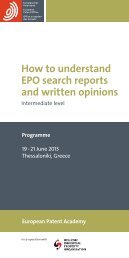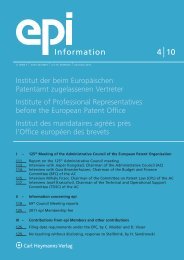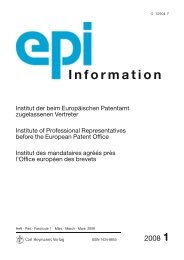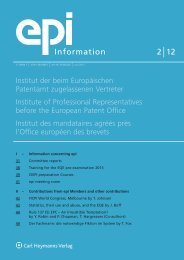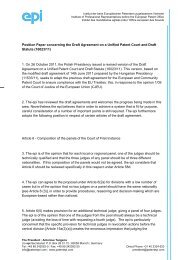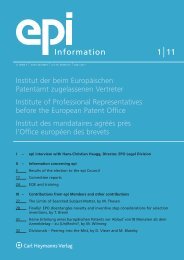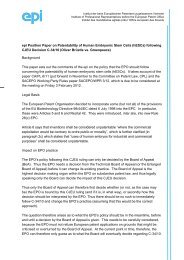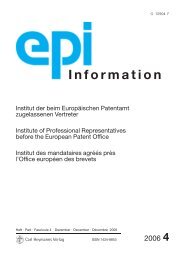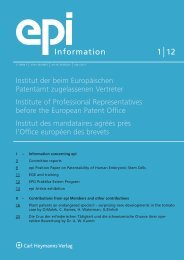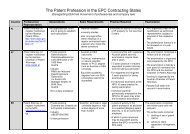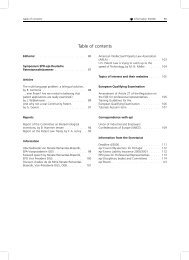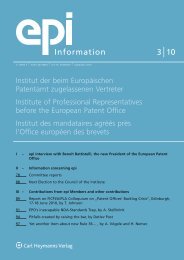epi Information 2/2009
epi Information 2/2009
epi Information 2/2009
You also want an ePaper? Increase the reach of your titles
YUMPU automatically turns print PDFs into web optimized ePapers that Google loves.
<strong>Information</strong> 2/<strong>2009</strong> Articles 63<br />
usually have very relevant prior art cited in them, and the<br />
claims will have been (re-) drafted in the light of that prior<br />
art.<br />
5. Discussion<br />
Expedited examination would bring the median time to<br />
grant of European Patents down by between 1 and 1.5<br />
years. Currently the EPO’s 2008 Annual Report quotes<br />
that ’On average, a granted patent was published 43<br />
months after the application was received’. However,<br />
this is not the time from the priority date. The 43 month<br />
figure also disguises the many cases that stay in the<br />
system for 4-7 years before being abandoned, refused,<br />
or granted after many attempts at amendment.<br />
Once the EPO had cleared existing backlogs, many<br />
applications would be granted within 2 years of their<br />
priority date.<br />
So what would be the costs and benefits of Expedited<br />
Examination?<br />
In 2007, the EPO’s fees from ’examination and grant’<br />
were 15% of all EPO income. If 50% of applicants<br />
manage to meet the 1 month deadlines given in Table 1,<br />
and obtain grant after at most one EPO communication,<br />
then examination fee refunds would reduce total EPO<br />
income by approximately 4%. Notably, the 500 Euro<br />
designation fee, 790 Euro grant fee and any claims fee<br />
would still be payable. The examination fee is 1405<br />
Euros.<br />
Against this 4 % reduction in EPO income, there<br />
would be a very major reduction in the time spent by<br />
EPO examiners, through four different effects. Each of<br />
the following four effects would result in a significant<br />
time saving for examiners, although the first effect is the<br />
most important:<br />
(i)<br />
There would be many cases in which fewer examination<br />
communications would need to be issued, and<br />
those communications would need to cover fewer<br />
issues. This is because applicants will submit European<br />
Applications in better condition for grant, in<br />
order to try and gain a refund of the examination<br />
fee. If a first EPO communication does have to be<br />
issued, then applicants would, for example, be likely<br />
to take exceptional care not to add subject matter in<br />
their response.<br />
(ii) The reduction in time for an examiner to re-familiarize<br />
himself with an application. This is because the<br />
representative’s response would come back one<br />
month after an EPO communication is issued, rather<br />
than the usual four to six months.<br />
(iii) The reduction in the large number of old cases that<br />
are handed over from one EPO examiner to another.<br />
This would also save time for representatives.<br />
(iv) The elimination of oral proceedings for those cases<br />
that receive a refund of the examination fee.<br />
Considering cash flows, the EPO would also gain<br />
through increases in the remittals of 50% of each<br />
national renewal fee. Proprietors of granted patents will<br />
pay these fees to the national offices sooner for each<br />
application that qualifies for an examination refund,<br />
than otherwise would have been the case. Clearly, the<br />
national offices will also gain significant revenue from<br />
this. The increase in the net income to the EPO from<br />
national renewal fees would however be partially offset<br />
by the fact that applicants would pay fewer annual<br />
Art. 86 EPC renewal fees directly to the EPO, while the<br />
application was pending. The exact calculation may<br />
result in a benefit or a cost, since the typical number<br />
of member states in which granted European Patents are<br />
validated is likely to change significantly with awareness<br />
of the London Agreement.<br />
Similar analyses apply to the ’Opposition Fee Refund’<br />
and ’SME refund’ in Table 1.<br />
Expedited examination would contribute to a major<br />
reduction in the uncertainty created by undecided patent<br />
applications, and hence to the hidden costs to Europe’s<br />
companies. This effect may well be the greatest overall,<br />
but is the hardest to turn into monetary values.<br />
Concerning the SME refund, it is useful to compare<br />
the proposal with the 50% reduction in most fees that<br />
the USPTO offers to SMEs. That refund is not linked to<br />
any proactive patent prosecution work by the applicants,<br />
but is simply dependent on their size. Other patent<br />
systems, such as the Indian system, also offer large<br />
percentage reductions in fees, based on the status of<br />
the applicant. In contrast, the SME refund in Table 1<br />
would change the way that SMEs prepare and prosecute<br />
their patent applications, in return for the additional fee<br />
refund that they might eventually receive.<br />
6. Conclusion<br />
At present, a European Patent Application is likely to<br />
have been the responsibility of several different people,<br />
before being granted. It is also likely to have been<br />
amended on several occasions, spaced apart by 1-4<br />
years. This is not conducive to producing quality patents.<br />
The European Patent Convention currently offers little<br />
motivation to put an application in order for grant, or to<br />
settle an opposition quickly. There is a great difference<br />
between having the motivation to take an action as soon<br />
as possible, and the fact stated in Enlarged Board of<br />
Appeal Decision G1/93 that ’an applicant is responsible<br />
for amendments made…’. What is needed is a new<br />
motivation.<br />
The system of Expedited Examination presented in<br />
Table 1 above offers a net ’win-win’ outcome. A key<br />
issue is that Expedited Examination would be optional,<br />
since it is then not forced on any applicant or opponent.<br />
The three main effects would be:<br />
(i)<br />
Many more cases being granted with fewer, or no,<br />
EPO communications having been issued.<br />
(ii) Eliminating the duplication of work, which currently<br />
simply wastes time; and<br />
(iii) Bringing forward the point in time when many<br />
European Patent Attorneys do most of their work<br />
on an application.<br />
Speeding up the process from the start of examination<br />
through to grant would almost entirely eliminate the<br />
routine passing-on of unsettled cases between exam-



